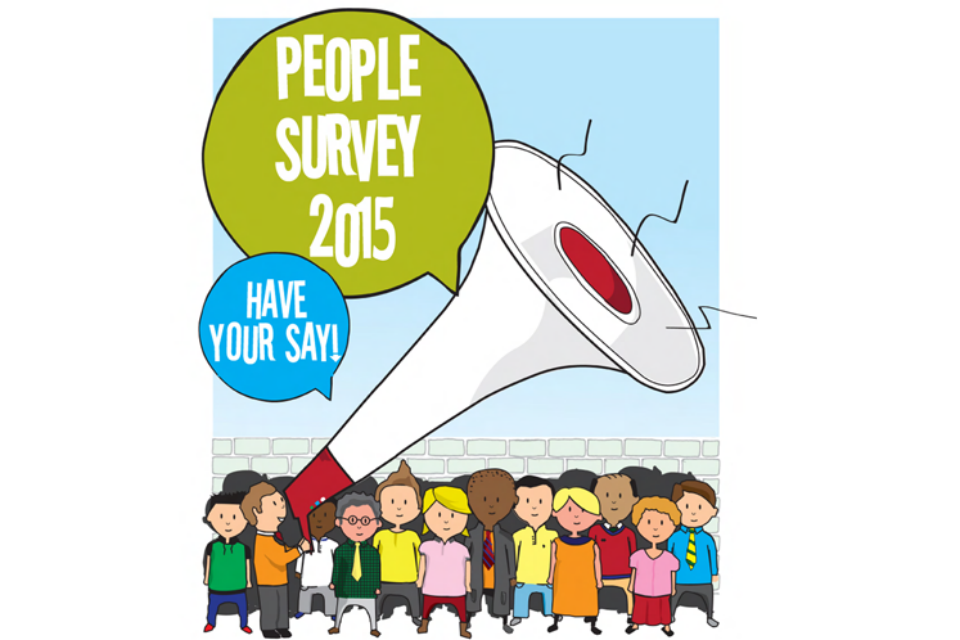
As the Project Manager for the Employee Engagement Team, it’s my job to make sure that departments and agencies get their Civil Service People Survey tailored and ready. Overall, this means giving over 400,000 civil servants the chance to take the survey in the same month, so that we can the get the first cut of results to departments within a fortnight of the survey being completed.
Quite a challenge! I couldn’t do it alone, but you may be surprised how few of us there are – just five in the Employee Engagement Team here at the Cabinet Office.
One hundred surveys in one
While we tend to talk about the People Survey as a singular whole, in practice I am project managing over 100 surveys, which are largely the same but all slightly different. For example, coastguards in the Maritime and Coastguard Agency don’t face the same issues as aeronautics engineers in the Ministry of Defence, yet they’re all civil servants.
 My team develops close working relationships with our departmental survey managers so that someone is always available to help with the wide range of issues connected with such a big piece of work. We resolve queries about departmental structure and the confidentiality of the survey; we unpick technical bugs; and we immerse ourselves in a department’s organisational culture to help the survey managers craft a bespoke survey. Right up to the last day of the survey, we can be navigating changes to department structures and even team names.
My team develops close working relationships with our departmental survey managers so that someone is always available to help with the wide range of issues connected with such a big piece of work. We resolve queries about departmental structure and the confidentiality of the survey; we unpick technical bugs; and we immerse ourselves in a department’s organisational culture to help the survey managers craft a bespoke survey. Right up to the last day of the survey, we can be navigating changes to department structures and even team names.
We also organise a series of communication activities. These include hosting workshops to train and support survey managers; and writing a weekly newsletter to keep everyone up to date with deadlines, guidance and how to ensure the survey remains relevant in the fast-changing government environment.
Meaningful results
Simply delivering the survey is a mammoth operation. But this is only the first part of the process. Analysing the data the survey produces to get meaningful results, statistics and information about what civil servants think of their organisations is crucial for identifying what we do well and where we could improve. Every year, we deliver over 9,000 reports to organisations and produce guidance for departments on how they can maximise insight from their departmental data sets.
We also provide analysis, support and briefing to cross-government stakeholders, including senior and strategic stakeholders at the centre of government. This information has been consistently used to make major improvements since the People Survey began in 2009. We have also used the data to identify and interview teams who have achieved outstanding wellbeing or engagement scores. You can read our first four case studies here.
Employee engagement
My own background is in leading people change. As an HR specialist, I particularly enjoy the opportunity to advocate the amazing difference that employee engagement practices can make to the lives of Civil Service employees.
From the moment the Civil Service People Survey 2015 was launched at the beginning of this month, my colleagues and I were getting stuck into the really fun part of our year. We are out and about delivering presentations and taking part in conferences and workshops to embed good practice and bring public sector employee engagement to life. You may have seen some of us recently at Civil Service Live. The essence of employee engagement is that, given the right circumstances, employees will be prepared to 'go the extra mile' for their organisation, to the benefit of both the business and employee wellbeing. This work is going on in a government organisation near you, right now!
The Civil Service is a proud advocate of data transparency, so unlike many organisations, we publicly share our survey results. Watch this space when the Civil Service People Survey 2015 results are published in November.

12 comments
Comment by Paula Brown posted on
The thing that infuriates me is the question design. Having had 7 managers in the last 25 months, with wildly varying styles, which one do I refer to when completing the survey? Also how happy I was yesterday generally has little to do with work. So to see press reports about the happiness of civil servants going up last year, and the implication that Government/ Mangement were responsible for that increase outraged me. I also echo the earlier comment regarding the draconian and discriminatory performance management system. One of our senior managers said in a staff briefing that the system was introduced because of the responses to the staff survey. Just because staff complain about poor management does not mean we asked for this bureaucratic performance pay system, that takes up too much resource, and drives perverse outcomes.
Comment by Steve posted on
An interesting article - it is good to understand what areas with good scores are doing differently to those with lower scores. Perhaps a little more detail would be beneficial - how are they doing some of the things they reference? I would also be interested in seeing case studies of departments with much larger staff complement e.g. 300. I would also be interested in case studies where departments had low scores and then turned them around - again, what was it (in detail) that they did and how did they do it?
Comment by Dave posted on
I will complete the survey when management have proper negotiations with unions about a proper pay rise and issues effecting us like PMRs. They have the gall to talk about "going the extra mile" whilst our living standards are diminishing year on year. I will also take the survey more seriously when instead of addressing pink and fluffy issues like Learning and Development they actually do something about one of the biggest issues identified every year, Bullying.
Comment by H posted on
Dilbert - got it one!
Comment by Lee posted on
The trouble is that today employees will now go the extra mile in the opposite direction to what senior management need. There is a distinct lack of engagement between staff and the senior managers. By this I mean HEO grade and above. Engagement between AO/EO is fine but the higher you go the less engagement there is. But to their credit HEO's will state that this is not an issue and they are fully enagaged with their staff. Am sorry but you need to take the rose tinted glasses off and see the truth. I really do hope the staff survey rams this point home. AGAIN.
Comment by AD posted on
For a view of surveys in other places try this Dilbert (I'm sure nothing like the civil service) http://dilbert.com/strip/1999-01-01
Comment by Kevin posted on
I would fill it in without hesitation if I thought that my concerns were being addressed rather than using it as an exercise to "spin" negatives into positives and managers using it to "pat themselves on the back". After 11 years, I am still waiting for this to change and have no confidence that it will do so in the next 11 years!
Comment by Sigourney Weaver posted on
I have nothing to say...
Comment by John posted on
Why can a person be able to fill out the survey more than once?
How do you identify that a person has completed the survey more than once? What is done about the invalid entry, if anything?
How can you verify that a person filling out the form is a civilian or Service personnel (for the MOD version)?
Unless these questions can be properly answered, I shall not be filling it out.
Comment by Anthony posted on
All very well asking & expecting people to complete the Have Your Say survey, but will Management actually take note of what is said?
Comment by Buster Friendly posted on
Since the MoD survey was used to justify imposing the hated, divisive, discriminatory and demoralising Performance Management system, I will not be taking part in a provably corrupt and biased survey, which is written and manipulated to give management the results they want.
Comment by RFMcD posted on
Distress caused by the way PMR was operated was most of the cause of finally 'going the extra mile' for me. When I did the sums I found that, with some lifestyle adjustments, I could afford to 'go the extra mile' and retire early. My blood pressure is at last normal for the first time in more than 30 years. I really do appreciate how lucky I am and feel truely sorry for any ex-colleagues in the position I was pre-retirement!